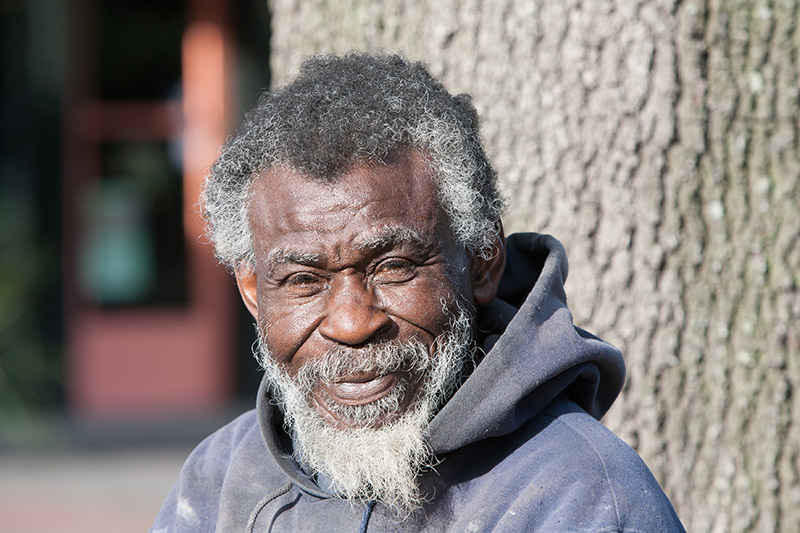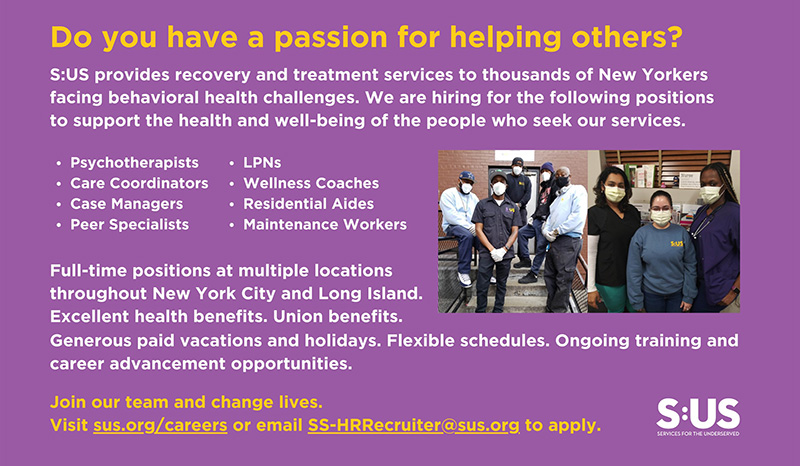This article is part of a quarterly series giving voice to the perspectives of individuals with lived experiences as they share their opinions on a particular topic. The authors are served by Services for the UnderServed (S:US), a New York City-based nonprofit that is committed to giving every New Yorker the tools that they can use to lead a life of purpose.
We are four New Yorkers ranging in age from 39 to 62. We all receive support from Services for the UnderServed including housing, mental health services (therapy, medication management, and psychiatric rehabilitation), help preparing for and finding employment, and/or case management.

Stigma Causes Harm
We have all experienced stigma because of mental health challenges, chronic illness, and/or homelessness. It has been really hard for all of us when people treat us differently because of what we’re going through. Stigma has made us more protective of ourselves and less trusting of others.
“After I went to the hospital, people looked at me differently, people stayed away from me, labeled me as crazy – everyone, including my friends and family. It made me standoffish and very private. I was very non-trusting of others. I didn’t feel like anyone did anything that made me feel safe. Everybody pushed me away. I really wanted people to have an open mind, ask me questions, hear me out, listen to me to understand where I was coming from,” said Robert. “I was constantly thinking ‘What did I do wrong?! Was it my fault?! Are people right about me?’ I finally came to the realization that everyone goes through ups and downs and that has made me happier and more in tune with myself.”
Glenn said, “For me, the stigma around my HIV was the biggest thing I faced. People really didn’t understand the virus and how you could transfer it and I was very stigmatized. My mom would give me plastic forks and knives to eat with while everyone had silverware. They would scrub the toilet bowl after I used the bathroom. There was a real lack of education and disconnect, and it didn’t work well for me. The reactions I got from my loved ones made me feel more rejected and I ended up just turning more to the streets and did more drugs as a way of dealing with things.”
“I hate the fact that when people know you have mental health issues that they call you ‘crazy.’ I hate the stigma of ‘crazy.’ People don’t understand your mental health and you feel like they don’t understand you. I get into arguments with a lot of people because I know I’m triggered by the things they say, especially if someone calls me crazy, a liar, or an unfit mom. That triggers me and my reaction is to hit when I hear things like that. I hate being called those things but there’s a stigma with bipolar depression and people think that you can’t tell what is real,” said Rachelle.
“There is stigma when it comes to people with mental health having to acquire housing and supports. Because of that I tend to not share much about myself,” Stephanie said. “I think the biggest source of stigma came from me. I would beat myself up, saying I didn’t want to take meds, I didn’t want to go to treatment. I stigmatized myself a lot in that aspect. The way I looked at myself six years ago was I didn’t need the help. I thought it was okay, I was really trying to be strong and was stubborn in telling people I didn’t need help even though I knew I might. But the mind is an organ. It’s like any other organ in the body, and if there is something wrong you need to treat it, and it needs to be taken care of and medicated; if there are symptoms, you need to treat it to be healthy. All of the same things that apply to other body parts apply to the mind because it is the powerhouse of the body. I finally realized that and I took the stigma off of myself.”
Therapy Helped Us in Different Ways
Most of us have been aided by therapy; we’ve become more stable and made progress in our lives.
Robert said, “When I took therapy seriously it really helped me. I became more understanding of who I was and what I was going through. S:US therapists listened with an open mind and gave good advice, especially at times I needed it the most. I was able to talk about anything and they didn’t judge me. The advice and experience from them helped a lot. Therapy was a place to speak my mind and it helped me open up. Everyone was very receptive to listening to me and gave me genuine advice from a non-judgmental point of view, which was something I really needed.”
“I appreciate having someone to go talk to when I’m having a hard time or need help. If people who live here start using (substances) again, they are able to talk to the counselor and say, ‘Hey I can’t stop using’ and get the help they need by being able to go to detox or rehab – it’s life-saving. When people are on their own, nobody is checking up on them and people are using and can be found dead, but here I feel safe because the staff checks up on me,” said Glenn.
“Four years ago, I became a grandmother and things became clear. I didn’t want my grandson to have the same problems I went through. And that was when I started really going to therapy because I didn’t want that generational cycle to continue. I was staying away from people I care about and so focused on the two people I’d lost (my two sons) that I didn’t realize my relationships with my other kids were deteriorating. With therapy, I learned how to get through things, started looking for a job and practiced strategies to control my anger, like journaling, calling a counselor, and counting backwards. Whenever I called my counselor they would call me back quickly and I felt like I had so much support. It really helped that they had my back when I needed it,” Rachelle said. “Mental health is an important issue. People don’t want to be in my community because they don’t want to be crazy. But S:US can make you feel comfortable enough to talk to them. I didn’t think I wanted to talk at first, just wanted to get something off my chest, but afterwards it made me understand that someone could understand me without bias and that will help you come back.”
A Support System and Stability Are Essential for Mental Health
Experiences with mental health, chronic illness, and homelessness can make people feel alone. We all felt that way at some point. But reaching out to other people – whether that’s family, friends, counselors, or S:US staff – has been a great help to all of us.
“The S:US staff are positive, caring, and loving people who show true concern for the tenants. They treat their work as more than a job and they do not look down on me. They have been sounding boards for me, they’re my confidants and give me support. The staff helps and uplifts me,” Glenn said. “I come from a Christian family, I gravitated towards my roots of church life and that helped me get grounded. That’s been my source of energy, prayer, and meditations. Over the years it’s been NA meetings, AA meetings, any time I’m going through something – ex addiction, food addiction, gambling addiction, mental health services like talking to a psychiatrist or therapist – I found places where I could get support.”
“Before coming to S:US and in my early 20s, it was extremely isolating. I felt alone. Recently in the last year, I’ve reconnected with people (friends and family). They have had a more open mind, especially when I am showing them how good I’m doing and how much I’ve improved. I was able to show others that I was the same person as before my mental health issues, just wiser,” said Robert.
“Since receiving services at S:US, I feel a lot more outgoing and more ambitious. I feel like I can achieve certain things when I put my mind to something. Being able to have a place where I call home and a roof over my head helped a lot. Having the stigma of being homeless in a shelter was very difficult, it caused me to be unstable. I really needed the stability that S:US gave me through housing,” said Stephanie. “I’ve been thankful to be able to take my medications, it’s very important to my mental health.”
“I have been improving my relationships with my kids now; S:US cared about my kids and helped me rebuild those relationships. If it weren’t for S:US, I would be locked up. I thank them for giving me the tools to walk away and go to a higher authority to deal with the situation. They helped me go to court and file complaints from people who were antagonizing me and they were really fighting for me. They call and check on me and my kids,” said Rachelle. “If you can’t talk to family or friends, you have to have a support system because you cannot overcome mental health without a support system.”
Messages for Others Experiencing Similar Challenges
We know there are many people who are going through things like we have. It’s hard to see how things can get better when you’re in it, so we have messages to share from each of us.
“You are not alone. Therapy works. If you’re willing to be honest and give it your best shot, you’d be surprised how well it works,” said Robert.
“I would like others to remain faithful because things work out as planned, when goals are set and put down on paper they really happen, like a vision board. If you’re able to have a vision and a plan, if you remain focused it can happen for you, if you need to do better. That was my main goal,” said Stephanie.
“I want people to know that there is help out there. Whatever you’re going through, even living with HIV, S:US can help. S:US supports the neighborhood and they are there for your health: mentally, physically, financially. For individuals who are struggling, all you have to do is apply, abide by their rules and you can get better,” said Glenn. “I want to let our youth know that even if they have HIV, they can live a long and healthy life. Chronic illness is not a death sentence.”
“I want people to know that there is a support system and there are always people ready to hold your hand, give you a nudge, and say that they miss you,” said Rachelle. “I want people in this situation to know they are not alone, reach out and even if you don’t want services, just try it. Talk to someone, you will find something and help in some way, even if you don’t want mental health, they can help you and you can continue coming back for more. Try it.”
There’s still a lot of stigma that people like us who have mental illness, chronic illness, or homelessness face every day. But we’ve found ways to overcome it and we know that other people can too. We appreciate organizations like S:US who are raising awareness, providing services, and helping to reduce stigma so we can lead stable, fulfilling lives.
For more information about Services for the UnderServed (S:US), visit www.sus.org.








